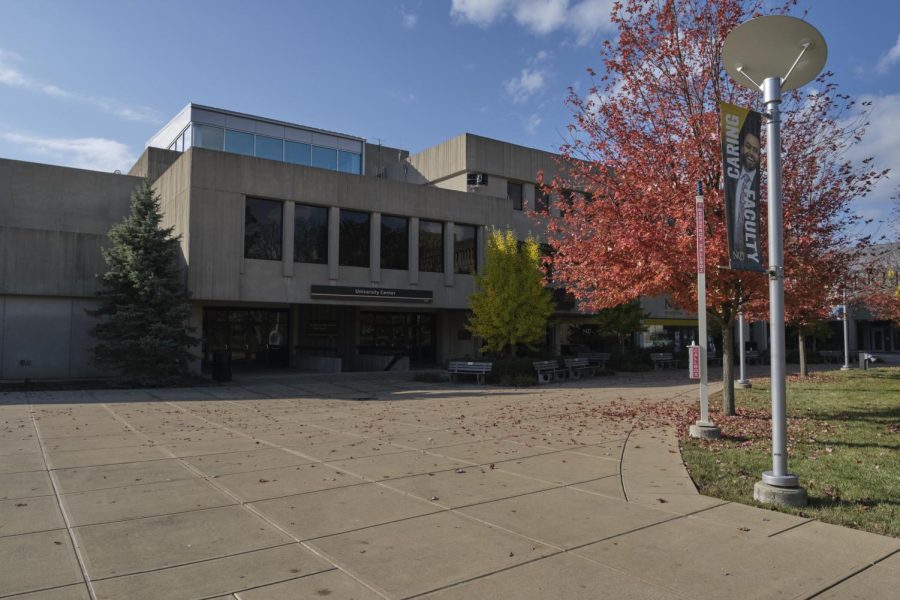Your donation will support the student journalists of Northern Kentucky University. Your contribution will allow us to purchase equipment and cover our annual website hosting costs.
“Their support for us has plummeted”: Faculty Senate president speaks on budget, hiring practices
February 18, 2023
NKU YSDA met with John Farrar in the University Center Feb. 8 on the budget situation and NKU’s hiring practices.
Faculty Senate President John Farrar spoke with the Young Democratic Socialists of America’s (YDSA) NKU chapter at a Feb. 8 meeting about hidden factors behind the budget deficit.
Farrar theorized that administrators contributed to the deficit by being reluctant to make difficult decisions. Wanting to satisfy every party, former president Ashish Vaidya did not intercede when he heard that the interim chief financial officer was having trouble working with faculty and staff. Similarly, former provost Sue Ott Rowlands allowed academic departments to keep hiring faculty when they lacked the funding to do so, leading to the situation where there are more faculty than needed in certain areas.
Unsustainable hiring also applies to staff, who according to Farrar have been perennially underpaid when pension and benefits are inexplicably not taken into account. “We could afford $5 million, we promised someone $10 million but it actually cost $13 million. So we’ve got $8 million unaccounted for that we must somehow fix,” he said as an example.
On the bright side, NKU’s financial situation has been more manageable than initially feared. 14 to 16 candidates were expected for the Faculty Voluntary Separation Program, but 22 tenured and tenure-track faculty members ended up being approved to leave on their own volition. This has resulted in considerable savings so that there are not as many cuts to faculty as originally envisioned, Farrar said. For this academic year NKU has $270 million budgeted, so the important question is what it is spent on.
“If we really value diversity and equity, then put the money toward it, invest in that. If you don’t invest in it, is it really a priority?” Farrar asked.
He is more concerned about temporary part-time lecturers, who are going to be hit hardest by the budget deficit. Their contracts do not automatically renew unless the university contacts them in advance for renewal, and unlike renewable faculty, their salaries are not part of the base academic funding. Problems are compounded when entire subject areas are taught only by temporary lecturers, such as Arabic. Losing these faculty members means Arabic might not be offered anymore, Farrar said.
NKU has been especially reliant on temporary lecturers because they can be paid with whatever remains in each department’s budget at the end of the school year, which Farrar calls “a crazy practice.” Giving a temporary lecturer a renewable position requires setting aside a recurring base fund for compensation and can be difficult, resulting in part-time lecturers remaining temporary—a career limbo—for years on end.
“We’re abusing people. We’re taking advantage of their weakness, for whatever reason, to keep them stuck in a temporary position,” Farrar said of the practice. “Temporary should be filled on an emergency basis, [when] we don’t have regular faculty to teach it and we plug a hole. But if we’re plugging a hole for six years straight then that’s no longer temporary. That person should be in a regularly budgeted position with job security.”
One factor that looms large behind the budget deficit and these hiring practices, according to Farrar, is declining state funding. The cost of utilities in January this year was $100,000 higher than in the previous year, and costs will keep on rising, adjusted for inflation, while NKU has been receiving less funding from the Commonwealth of Kentucky compared to 1998.
In 1998 NKU served about 5,000 students and received a total of $82 million from the state, commensurate with the budget at the time. Current state funding for the university is $50 million, while the budget sits at $270 million and the student population is over 15,000. Although NKU is considered a state university, Farrar calls the institution a state affiliate because 80% of the budget comes from outside of Kentucky.
“The problem has been when the budget in the state is lean, there are budget cuts. Those budget cuts just perpetuate in the future and never get restored. The fundamental problem to me is that the state is not funding higher ed the way it ought to be funded,” Farrar said, pointing out that Kentucky has a budget surplus—the state recently passed and signed House Bill 1 to lower the state’s personal income tax rate from 4.5% to 4%. “In ‘98 we received 40% of our budget from the state, this year 18%. Their support for us has plummeted.”
He proposed a dialogue with the state administration, where NKU representatives compare state funding per student at NKU with that at other regional public universities. Christopher Wilkey, associate professor in English and faculty advisor for NKU YDSA, suggested that the organization could create a student coalition to argue for prioritizing higher education and making it more affordable for students. If NKU receives more funding, more staff positions could be filled and create more jobs for Kentuckians, he said.
To this end, YDSA spent the following week’s meeting planning an event to inform the wider campus community on budgetary concerns, with the hope of drawing more attention to a prospective student coalition. They decided on a Student Budget Assembly for 2-4 p.m. March 15 in rooms 102-104 in the Health Innovation Center.

